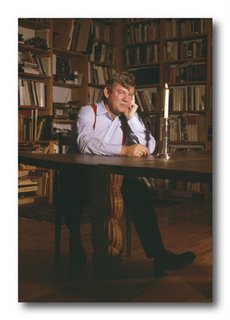The Standard Bearer

A cultural critic makes no apologies for being an elitist.
By Jonathan YardleyThings I Didn't Know by Robert Hughes
"...Earlier, from the Jesuits, Hughes had learned that "no matter what the demands of 'self-expression' may be, nothing is anything without fully articulate, conscious form." This conviction, coupled with his passionate belief in the transcendent possibilities of art, permitted Hughes to evolve over the years into modern art's most demanding critic. Deeply sympathetic to "the hostile, nervy freedom from parental and religious authority embodied by Surrealism," he nevertheless insisted that art had to be more than "new" to be good, and over the years he came to be a fierce opponent of the faddism to which the art world is so susceptible. He was strongly influenced by the writing of Kenneth Clark, Cyril Connolly and, especially, George Orwell, whose "direct use of the English language, in exposition and in argument," and whose willingness to follow his own nose he emulated to obvious and happy effect..."
"...Hughes is, by his own rather defiant declaration, "completely an elitist, in the cultural but emphatically not the social sense." He is, "after all, a cultural critic, and my main job is to distinguish the good from the second-rate, pretentious, sentimental, and boring stuff that saturates culture today." He quite properly refuses to apologize for this: "I am no democrat in the field of the arts, the only area -- other than sports -- in which human inequality can be displayed and celebrated without doing social harm." How right he is, and how vigorously he argues his case -- which is to say the case for informed judgment independent of fashion -- in this splendid book."
<< Home